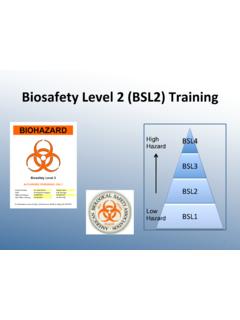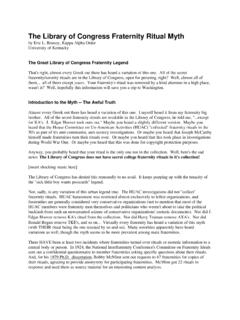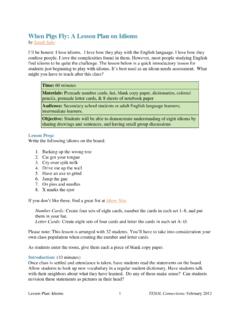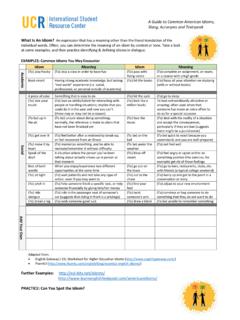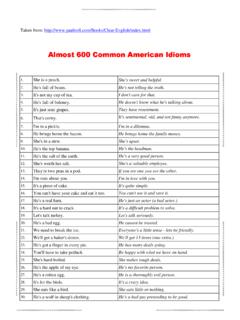Transcription of Idioms - Franklin & Marshall College
1 An idiom is a set expression that seems to defy logical grammatical explanation. Native speakers growing up with a language incorporate Idioms into their speaking and writing without much difficulty, but non-native speakers often find idiomatic expressions the most difficult parts of learning a new language. Such is certainly the case in learning english . The difficulty is that you cannot take the words in idiomatic expressions literally and predict meaning based on individual words. For examples, when someone offers to give you a hand, this does not mean literally that she will remove her hand and offer it to you. And when a friend says that he will hit the hay, he means that he is going to bed, not that he plans to strike a bale of hay. If you are bored with television, why would you not be tired with television? Instead you are tired of television. You are dependent on others yet independent of others.
2 You may wait in line to be seated at a restaurant, but the waitress waits on you, while you wait with patience. These idiomatic combinations with prepositions may seem strange and perverse, and there are not simple rules for learning them. When in doubt about the use of the appropriate preposition following a word, consult a good dictionary or usage book. (See a list on pages 2 and 3.) Although dictionaries do not list the correct preposition for all nouns, adjectives, and verbs, good dictionaries do list many of the appropriate combinations. Do not look up the preposition but rather the word with which it is used. The following is an entry from the 2nd edition of The american Heritage Dictionary that illustrates the information available about the word agree and its idiomatic combinations: agree (e-gre ) v. agreed, agreeing, agrees. intr. 1. to grant consent; accede. Used with the infinitive: He agreed to accompany us.
3 2. To come into or be in accord: The copy agrees with the original. 3. To be of one opinion. Often used with with: Didst though not agree with me for a penny? (Matthew 20:13). 4. To come to an understanding or to terms. Used with about or on: Is it possible to agree on such great problems? 5. To be suitable; appropriate. Used with with: Spicy food does not agree with him. 6. Grammar. To correspond in gender, number, case, or person. ir. To grant or concede. Used with noun clause: He agreed that we should go. See Synonyms at assent. [Middle english agreen, from Old French agreer, from Vulgar Latin aggratare (unattested), to be pleasing to: ad-, to + gratus, pleasing, beloved, agreeable (see gwere-1 in Appendix*).] Synonyms: agree, conform, harmonize, accord, correspond, coincide. These verbs all indicate compatible relationship between people or things. Agree may indicate mere lack of incongruity or discord, but often it suggests acceptance of ideas or actions and thus accommodation.
4 Conform stresses close resemblance in form, thought, or basic characteristics, sometimes the result of accommodation to established standards. Harmonize implies a relationship of unlike things combined or arranged to make a pleasing whole. Accord implies close similarity between things or harmonious relationship or both. Correspond refers either to actual similarity in form or nature or to similarity in function of unlike things. Coincide stresses exact agreement in space, time, or thought. courtesy of the Franklin & Marshall College Writing Center Idioms Below are listed examples of idiomatic combinations that cause difficulty: angry with someone angry about an event or happening differ with a person differ about or over a question familiar to someone familiar with a problem put on the stove put in the refrigerator result from [a cause] result in [an effect] wait at a place wait for a train or a person wait on a customer Much like idiomatic expressions that involve prepositions, some word pairs are troublesome and require careful distinction.
5 Among/between use among with three or more entities; between with two. Among the members of the class, the differences between the president and vice president were apparent. few/less use few to name items that can be counted. Less refers to general amounts. With less heat in the dorms, students would have fewer colds. number/amount use number with quantities that can be counted; use amount with those that cannot. The number of pages assigned affects the amount of homework. Sources for Help with Idioms The most useful and popular desk dictionaries: The american Heritage Dictionary of the english Language (2nd edition) Webster s Ninth New Collegiate Dictionary Unabridged Dictionaries The Oxford english Dictionary The Random House Dictionary of the english Language Specialized Dictionaries on Idioms Advanced Learner s Dictionary of Current english Oxford Dictionary of Current Idiomatic Usage Webster s Dictionary of english Usage Exercise in Idiom Usage Insert the preposition that appropriately completes each of the following idiomatic expressions: 1.
6 The choice _____ Bucknell and F&M was difficult for me. 2. The waitress was so busy that she had difficulty waiting _____ all the customers. 3. After class I waited _____ my roommate who was talking _____ the professor. 4. Some students constantly borrow money _____ their friends. 5. Park the car _____ the street when you arrive, not _____ the driveway. 6. The book is illustrated _____ a famous woodcut artist. 7. The estate was divided _____ his five daughters. 8. He hopes to participate _____ many activities. 9. I was sad to part _____ my adopted family when I left Australia after a year as an exchange student. 10. My brother is susceptible _____ upper respiratory infections. 11. She has time _____ her disposal. 12. The lived _____ South Ben when I first knew them. 13. Bring the tools _____ the tool shed when you leave. Put them here _____ the shelf. 14. Be careful _____ punctuation if you want to receive a good grade. 15.
7 I was astonished _____ John s attitude. 16. The kitchen is furnished _____ modern equipment. 17. The food processor is useful _____ chopping vegetables. 18. The sermon was followed _____ a hymn. 19. I believe you are familiar _____ the material in this chapter. 20. The dress was copied _____ a Paris model. 21. The sheep, frightened _____ the noise, began to run. 22. His arrival prevented us _____ going. 23. I will speak _____ Mr. Simons _____ a job in his department. 24. My mother always disapproves _____ my boyfriends. 25. The second edition of the book differed significantly _____ the first. 26. My professor was critical _____ my term paper. 27. When hiking in the park, one should beware _____ bears. 28. She was angry _____ her roommate because of the clutter in the room. 29. Her would sooner part _____ his friends than part _____ his Corvette. 30. The writer entrusted me _____ her manuscript. Answers 1. between 2. on 3.
8 For, with 4. from 5. on, in 6. by 7. among 8. in 9. with 10. to 11. at 12. in 13. into, on 14. with 15. by 16. with 17. in or for 18. by 19. with 20. from 21. by 22. from 23. with, about 24. of 25. from 26. of 27. of 28. with 29. with, with 30. with
